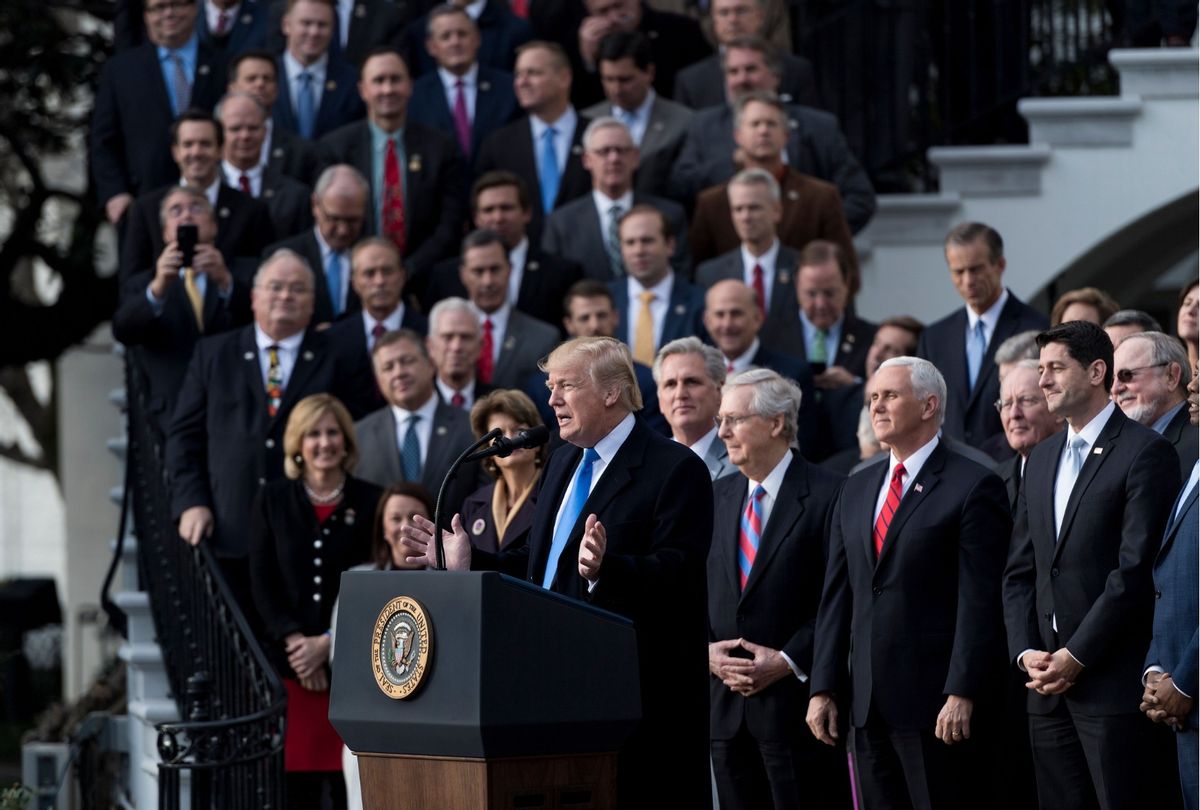Over the past years in the U.S., everyday Americans have been increasingly crushed under greed-driven inflation and debt, with homelessness hitting record highs. But as this modern affordability crisis has rocked households across the country, billionaire wealth has skyrocketed — and has now hit an all-time high, a new analysis reveals.
As of this month, the U.S.’s 806 billionaires are worth a collective $5.8 trillion, meaning that they control 1 in every 25 dollars of American wealth, according to an Americans for Tax Fairness report released Monday.
Due in part to the 2017 tax overhaul by Republicans, led by Donald Trump, this small group has seen an explosion of wealth in an extremely short amount of time.
Since the 2017 Tax Cuts and Jobs Act, U.S. billionaire wealth has doubled, from an already staggering $2.9 trillion. In 2017, none of the richest Americans were centi-billionaires, meaning that they did not have over $100 billion; now, the top 10 U.S. billionaires are all centi-billionaires, according to the report.
As of April 1, Jeff Bezos was the richest person in America, with $198 billion, while Michael Bloomberg was the least wealthy of the top 10, controlling $106 billion. Each of the top 10 billionaires, whose wealth springs from either finance or tech, has experienced a growth in wealth since 2017, with Elon Musk seeing an 850 percent increase.
Due to this influx to the very top, these 800 individuals now collectively control 1.5 times more wealth than the entire bottom 50 percent of American households, who share $3.7 trillion between 65 million households.
“Billionaire wealth doubling in just over six years is a clear signal that too much of America’s resources are flowing to the super wealthy,” said David Kass, Americans for Tax Fairness executive director.
While everyday Americans pay taxes on this wealth and contribute to crucial programs like Social Security with every paycheck, many of these billionaires use sophisticated methods to avoid tax bills, with some paying effective rates as low as 0.1 percent in recent years despite their staggering gains.
These tax avoidance methods are on top of the built-in advantages that the U.S.’s statutory tax rates already offer the rich — and the Trump tax cuts have superfueled the growing wealth gap in the U.S. in recent years. Some of the most impactful policies that affect individuals from the tax cuts, the report says, include cutting the top income tax rate from 39.6 percent to 37 percent, doubling the estate tax exemption under which dynastic wealth is not taxed and weakening the Alternative Minimum Tax, which was designed to ensure that wealthy taxpayers pay a certain tax rate to fend off abuse of loopholes.
A modest capital gains tax on just the $3 trillion gain that billionaires have added over the past six years, by contrast, could pay for forgiveness of all student debt, expansions of Medicare and the Affordable Care Act, free preschool, and more over the next 10 years, the report says.
Instead, Republicans are currently seeking to intensify the factors driving the growth of the wealth gap and push even more trillions toward the top. At the end of 2025, many of the most sweeping tax cuts will expire, but Republicans are seeking to make the Trump tax cuts permanent.
This regressive policy would massively benefit the rich; an analysis last year by the Institute on Taxation and Economic Policy found that the richest 1 percent of Americans would see an average tax cut of $25,650 in one year if the cuts were made permanent, while the poorest 20 percent would see an average tax cut of $100.
“The last thing we need to do now is permanently extend the Trump tax cuts,” Kass said. “Permanent extension of high-end tax cuts would cost trillions of dollars we could invest in working families and communities and would worsen the nation’s economic inequality that the latest billionaire figures so prominently highlight.”



Shares